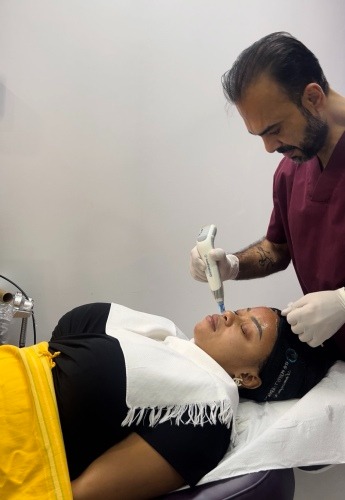As climate change intensifies, ushering in record-breaking temperatures and prolonged heatwaves worldwide, a vital yet often overlooked human function is being pushed to its limits: sweating. The body’s primary cooling mechanism now plays an increasingly critical role in helping us adapt to our warming world.
But as this essential process comes under strain, both the benefits and potential health risks of perspiration are drawing renewed attention from medical experts.
“People often think of sweat as a nuisance, but it’s one of the body’s most efficient ways to regulate internal temperature,” says Dr. Chirag Kotecha, Lead Specialist at Refine Skin & Body Clinic Uganda. “Without it, we would quite literally overheat and that risk is growing with every degree the global thermostat rises.”
Sweating can be triggered by various factors including physical exertion, emotional stress, or underlying medical conditions. In the context of rising global temperatures, the most urgent trigger is heat. As people spend more time in extreme conditions, their sweat glands must work harder to maintain homeostasis. While vital, this response places added pressure on hydration levels and the cardiovascular system especially in regions with limited access to clean water or cooling resources.
Increased perspiration can also signal deeper medical concerns. Conditions such as hyperthyroidism, infections, or menopause can cause excessive sweating. A more persistent and often misunderstood disorder, known as hyperhidrosis, affects individuals who sweat profusely even without heat or physical activity.
“Hyperhidrosis can be socially and emotionally distressing,” Dr. Kotecha explains. “It’s not just about physical discomfort it can deeply impact quality of life.” While most cases lack a clear cause, they are often linked to overactive nerves that stimulate sweat glands unnecessarily.
Interestingly, treatments originally developed for cosmetic purposes are now offering relief. Botox®, best known for smoothing wrinkles, is increasingly used to manage hyperhidrosis. The injections work by blocking the neurotransmitter acetylcholine, which would otherwise activate sweat glands.
“Botox® can reduce sweat production by over 50% for up to six months,” says Dr. Kotecha. “It’s a straightforward, in-office procedure with minimal downtime and interest is growing, especially as global temperatures rise.”
It’s essential, however, to recognize that sweating isn’t inherently problematic. Beyond cooling the body, it offers additional benefits such as skin detoxification, mood enhancement through endorphin release, and a reduced risk of certain skin conditions thanks to unclogged pores.
Still, as extreme heat becomes more common, there’s a pressing public health need to distinguish between normal and dangerous sweating. Conditions like heatstroke often begin with heavy perspiration before the body loses its ability to cool down a point when sweating abruptly stops and internal temperature spikes dangerously.
From Kampala to Kansas, the rising global heat is making sweat a frontline issue in the human fight for adaptation. As Dr. Kotecha emphasizes, “Sweat isn’t just a symptom it’s a survival tool. But it must be supported with awareness, hydration, medical care, and when needed, advanced treatments.”
As our planet continues to warm, respecting and supporting the body’s natural cooling system may prove vital one drop of sweat at a time.


















